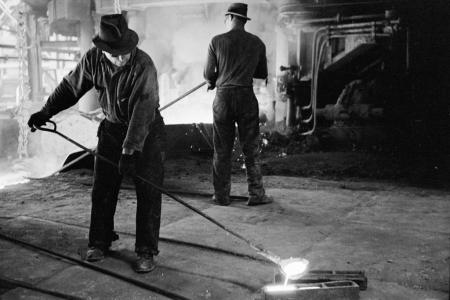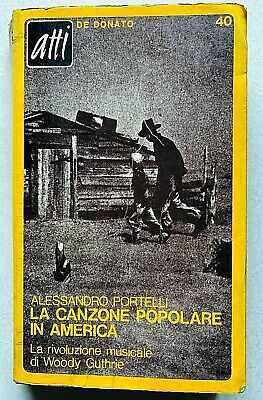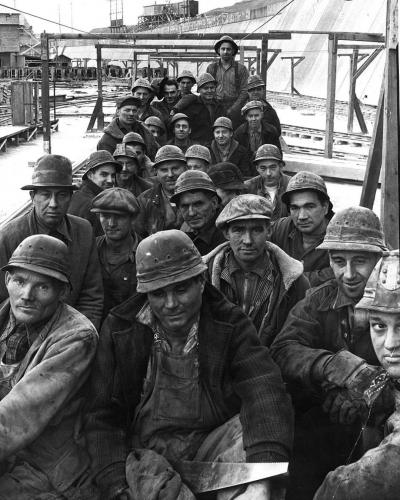Teräksen muokkaajat,
lisäarvon tuottajat,
ovat kuunnelleet teräksen soittoa.
He laulavat teille sen soiton:
»Kuinka nurjaa tässä elämässä,
kun riistolle lisäämme vain voittoa.«
Tehtaissa riistetään;
osingoista kiistetään.
Voitot täytyis' saada aina suuremmat.
Kun terrori kiihtyy, niin nurisee orjat,
että on: »Kyllä olot nämä kurjat,
siksi työolot pitäis' saada paremmat.
Teräs on soittanut,
laulunsa laulanut
heille, jotka terästä ain' muokkaavat:
»Tunne sun voimasi, työn joukko suuri;
murtuvi varmasti vahvinkin muuri,
joukkovoimaan työläiset luottavat.«
Teräs se soittaapi,
laulunsa laulaapi
aina, kun työmaalla työskennellään.
Sen soitossa suuressa orjatkin herää;
voimiaan alkavat yhteen jo kerään.
Ken syrjähän jäiskään nyt nöyrtymään.
Teräs se soittaapi;
lauluaan laulaapi:
»Työläiset, liittykää, järjestäytykää!
Siinä on vainen se voima, mi voittaa,
taistellen joukolla vapaus koittaa,
ja saapuvi onnekas keväinen sää.«
lisäarvon tuottajat,
ovat kuunnelleet teräksen soittoa.
He laulavat teille sen soiton:
»Kuinka nurjaa tässä elämässä,
kun riistolle lisäämme vain voittoa.«
Tehtaissa riistetään;
osingoista kiistetään.
Voitot täytyis' saada aina suuremmat.
Kun terrori kiihtyy, niin nurisee orjat,
että on: »Kyllä olot nämä kurjat,
siksi työolot pitäis' saada paremmat.
Teräs on soittanut,
laulunsa laulanut
heille, jotka terästä ain' muokkaavat:
»Tunne sun voimasi, työn joukko suuri;
murtuvi varmasti vahvinkin muuri,
joukkovoimaan työläiset luottavat.«
Teräs se soittaapi,
laulunsa laulaapi
aina, kun työmaalla työskennellään.
Sen soitossa suuressa orjatkin herää;
voimiaan alkavat yhteen jo kerään.
Ken syrjähän jäiskään nyt nöyrtymään.
Teräs se soittaapi;
lauluaan laulaapi:
»Työläiset, liittykää, järjestäytykää!
Siinä on vainen se voima, mi voittaa,
taistellen joukolla vapaus koittaa,
ja saapuvi onnekas keväinen sää.«
inviata da Pluck + Juha Rämö + CCG/AWS Staff - 5/8/2022 - 20:54
Lingua: Inglese
English translation / Traduzione inglese / Traduction anglaise / Englanninkielinen käännös: Eero Davidson (see Source)


Pittsburgh steel workers, around 1930.
Song of Steel
Makers of steel,
Producers of wealth,
Have heard the music of steel.
They sing the song of steel:
»How wrong it is in this life
To add more to the riches of the greedy.«
In the mills there is scheming;
The greedy are grasping for power.
Always they want more profits.
When aroused, their slaves murmur
Like this: »Sure, our living is wretched,
That's why we should have better working conditions.
Steel has its own music,
Its song has a message
To those who shape the steel:
»Know your strength, working masses;
Even the strongest wall can crumble,
If the workers trust their mass power!«
Steel plays a song;
It sings its own song
In the mill where we are working.
Even slaves bestir themselves;
They are beginning to gather strength.
Who would now remain timidly on the sidelines?
Steel plays a song;
It sings its own song:
Workingmen, unite, organize!
Therein lies the strength to win.
Union aids the fight for freedom,
And ushers in the joyful spring of life!
Makers of steel,
Producers of wealth,
Have heard the music of steel.
They sing the song of steel:
»How wrong it is in this life
To add more to the riches of the greedy.«
In the mills there is scheming;
The greedy are grasping for power.
Always they want more profits.
When aroused, their slaves murmur
Like this: »Sure, our living is wretched,
That's why we should have better working conditions.
Steel has its own music,
Its song has a message
To those who shape the steel:
»Know your strength, working masses;
Even the strongest wall can crumble,
If the workers trust their mass power!«
Steel plays a song;
It sings its own song
In the mill where we are working.
Even slaves bestir themselves;
They are beginning to gather strength.
Who would now remain timidly on the sidelines?
Steel plays a song;
It sings its own song:
Workingmen, unite, organize!
Therein lies the strength to win.
Union aids the fight for freedom,
And ushers in the joyful spring of life!
inviata da Juha Rämö - 27/8/2022 - 00:01
Lingua: Italiano
Traduzione italiana (parziale) / (Partial) Italian translation / Traduction italienne (partielle) / (Osittainen) italiankielinen käännös: Alessandro Portelli
"Rappresentativa dell'influenza rivoluzionaria degli operai di origina europea è una canzone scritta nella propria lingua durante il grande sciopero siderurgico del 1919 da un operaio finlandese di Pittsburgh, Axel Simonen. "
Da : "La Canzone popolare in America " di Alessandro Portelli - De Donato Ed. 1975 - pagg. 96-97

Da : "La Canzone popolare in America " di Alessandro Portelli - De Donato Ed. 1975 - pagg. 96-97

Canzone dell'acciaio
Voi che fate l'acciaio, che producete la ricchezza
avete sentito la musica dell'acciaio.
La canzone dell'acciaio dice :
non è una cosa giusta in questa vita
aggiungere ancora ricchezze alle ricchezze degli avidi .
[...]
L'acciaio ha una sua musica,la canzone ha un messaggio
per quelli che forgiano l'acciaio :
imparate la vostra forza, masse dei lavoratori;
anche il muro piu' forte puo' crollare
se i lavoratori fidano nel potere della loro massa
L'acciaio suona una canzone, canta la sua canzone :
lavoratori,unitevi,organizzatevi
in questo è la forza per vincere.
L'unita' aiuta a lottare per la liberta'
e apre le porte alla primavera della vita .
Voi che fate l'acciaio, che producete la ricchezza
avete sentito la musica dell'acciaio.
La canzone dell'acciaio dice :
non è una cosa giusta in questa vita
aggiungere ancora ricchezze alle ricchezze degli avidi .
[...]
L'acciaio ha una sua musica,la canzone ha un messaggio
per quelli che forgiano l'acciaio :
imparate la vostra forza, masse dei lavoratori;
anche il muro piu' forte puo' crollare
se i lavoratori fidano nel potere della loro massa
L'acciaio suona una canzone, canta la sua canzone :
lavoratori,unitevi,organizzatevi
in questo è la forza per vincere.
L'unita' aiuta a lottare per la liberta'
e apre le porte alla primavera della vita .
inviata da Pluck + CCG/AWS Staff - 27/8/2022 - 00:16
Lingua: Italiano
Traduzione italiana (completa) / (Full) Italian translation / Traduction italienne (complète) / (Täysi) italiankielinen käännös:
Riccardo Venturi, 27-8-2022 01:44

Riccardo Venturi, 27-8-2022 01:44

Lavoratori delle acciaierie di Pittsburgh, ca. 1950.
Canzone dell'acciaio
Fabbricanti d'acciaio,
Produttori di ricchezza,
Voi avete ascoltato la musica dell'acciaio.
Dice la canzone dell'acciaio:
“Com'è ingiusto in questa vita
Aumentare la ricchezza degli avidi.”
Nelle acciaierie fanno i furbi;
Gli avidi sono attaccati al potere,
Vogliono sempre maggiori profitti.
Quando si ridestano, i loro schiavi mormorano
Cose del genere: “Certo, la nostra vita è uno schifo,
Per questo dovremmo avere migliori condizioni di lavoro.”
L'acciaio ha la sua musica,
La sua canzone reca un messaggio
A chi dà forma all'acciaio:
“Siate consapevoli della vostra forza, masse lavoratrici;
Anche la muraglia più robusta può crollare
Se i lavoratori avran fiducia nel potere della propria massa!”
L'acciaio suona una canzone;
Canta la sua canzone
Nell'acciaieria dove lavoriamo.
Anche gli schiavi si mettono in agitazione;
Cominciano a raccogliere le forze.
Chi potrebbe ora mettersi timidamente da parte?
L'acciaio suona una canzone;
Canta la sua canzone:
Lavoratori, unitevi, organizzatevi!
In questo consiste la forza per vincere.
L'unione aiuta la lotta per la libertà
E annuncia la gioiosa primavera della vita!
Fabbricanti d'acciaio,
Produttori di ricchezza,
Voi avete ascoltato la musica dell'acciaio.
Dice la canzone dell'acciaio:
“Com'è ingiusto in questa vita
Aumentare la ricchezza degli avidi.”
Nelle acciaierie fanno i furbi;
Gli avidi sono attaccati al potere,
Vogliono sempre maggiori profitti.
Quando si ridestano, i loro schiavi mormorano
Cose del genere: “Certo, la nostra vita è uno schifo,
Per questo dovremmo avere migliori condizioni di lavoro.”
L'acciaio ha la sua musica,
La sua canzone reca un messaggio
A chi dà forma all'acciaio:
“Siate consapevoli della vostra forza, masse lavoratrici;
Anche la muraglia più robusta può crollare
Se i lavoratori avran fiducia nel potere della propria massa!”
L'acciaio suona una canzone;
Canta la sua canzone
Nell'acciaieria dove lavoriamo.
Anche gli schiavi si mettono in agitazione;
Cominciano a raccogliere le forze.
Chi potrebbe ora mettersi timidamente da parte?
L'acciaio suona una canzone;
Canta la sua canzone:
Lavoratori, unitevi, organizzatevi!
In questo consiste la forza per vincere.
L'unione aiuta la lotta per la libertà
E annuncia la gioiosa primavera della vita!
×
![]()





Musica / Music / Musique / Sävel: Edward Pylkäs
Testo / Lyrics / Paroles / Sanat: Axel Simonen
Source: Pennsylvania Songs and Legends, edited by George Korson, University of Pennsylvania Press,
Philadelphia 1949, pp. 451 - 453
(Sung by Axel Simonen at Glassport, 1947, and used by his permission. Recorded by Eero Davidson and Jacob A. Evanson. Translated by Davidson).
“I made up the words of 'Song of Steel' about 1930”, said Axel Simonen. “I was a steelworker then. On a visit to Detroit I recited the song to my friend Edward Pylkäs, another steelworker, who gave me the tune”. [Axel Simonen, see Source]
“Finally, this enumeration of ethnic musicians would be incomplete without mention of the men and women writing new song lyrics and music for their countrymen. Some were humble laborers unaccustomed to writing verse or with hardly any musical training. One of these, Axel Simonen, was a Finnish steelworker. About 1930 he made up the words to the 'Song of Steel'. Shortly thereafter a fellow steelworker, Edward Pylkas [sic], added the melody.” - A Sound of Strangers: Musical Culture, Acculturation and the Post-Civil War Ethnic American, by Nicholas Tawa, The Scarecrow Press, Inc., Metuchen, N.J. and London, 1982
According to personal witness (see: Pennsylvania Songs and Legends, edited by George Korson, University of Pennsylvania Press, Philadelphia 1949, p. 451-453), the Finnish steelworker Axel Simonen wrote the lyrics of Teräksen soitto around 1930. Axel Simonen lived in Glassport, a Pittsburgh borough which experienced severe crisis (along with other industrial boroughs in the same area) due to progressive closing of steel mills. According to Axel Simonen, on a visit to Detroit he recited the song to a friend a fellow steelworker, Edward Pylkäs, who had some musical training and composed the melody. The song was sung by Axel Simonen himself in 1947 in Glassport, and recorded by Eero Davidson (a Finnish musician and cellist) and Jacob A. Evanson, a music educator and song catcher who collected a great number of folksongs and hymns (including lyrics and music sheets) now held in Heinz History Center of Pittsburgh. As a matter of fact, Jacob A. Evanson himself wrote for Pennsylvania Songs and Legends the entire section including the “Song of Steel” by Simonen and Pylkäs. The section, named Folk Songs of an Industrial City, is available in .pdf format, but at the price of 30 euros. The song was originally contributed to the site by Pluck only in a partial Italian translation reproduced from Alessandro Portelli's “La canzone popolare in America” (Folksong in America), De Donato, 1975. Alessandro Portelli must surely have had access to George Korson's original source, but the scant infomation he provides on the origin of the song (“written during the great steel mills strike of 1919”) is not correct. The page has been totally reshaped by including the song title in its correct Finnish form, Eero Davidson's full English translation and a full Italian translation. All the relevant material has been provided by Juha Rämö in a personal communication. [RV]